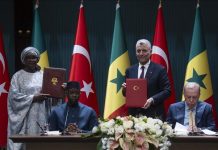Africa-Press – Ethiopia. In a major milestone for regional cooperation and mobility in Southern Africa, Namibia and Zambia have unveiled plans to allow their citizens to travel across their shared border using only national identity cards, doing away with the traditional requirement for passports.
The landmark initiative is designed to enhance cross-border movement, foster deeper economic ties, and boost regional integration.
The announcement was made by Namibia’s Minister of Home Affairs, Immigration, Safety, and Security, Albert Kawana, during the 59th Independence Day celebrations of Zambia, held in Windhoek, the Namibian capital.
Kawana confirmed that both governments are in the final stages of the necessary preparations to roll out the new travel arrangement.
“Soon, Zambian nationals will be able to enter Namibia using just their ID cards,” said Kawana. “We are working to phase out the requirement for passports between our two countries.”
This initiative follows a similar agreement between Namibia and Botswana, which already permits citizens of the two nations to cross borders using national identity documents.
These moves position Namibia as a pioneer in the Southern African Development Community (SADC) when it comes to promoting free movement through simplified border procedures.
If successfully implemented, this Zambia-Namibia agreement will mark one of the first ID card-based travel corridors in the region, reflecting growing momentum toward a more connected and integrated Southern Africa, The Voice of Africa reported.
Zambia’s High Commissioner to Namibia, Stephen Katuka, welcomed the announcement, emphasizing the strong historical and political ties between the two nations.
He highlighted Zambia’s critical support during Namibia’s liberation struggle as a lasting foundation for continued cooperation.
“The people of Zambia and Namibia share not only borders, but deep-rooted ties built on shared values and mutual respect,” said Katuka.
The diplomatic bond between the two countries continues to expand beyond trade and tourism.
Business leaders and civil society organizations across both countries have applauded the initiative, seeing it as a positive step toward SADC’s broader goals of regional integration, economic cooperation, and free movement of people.
Observers see this initiative as a potential blueprint for other countries in the region, especially those within the African Continental Free Trade Area (AfCFTA), where easing the movement of people is essential to unlocking the full potential of intra-African trade and investment.
If successful, the passport-free travel model between Zambia and Namibia could inspire similar agreements in Southern, Eastern, and even Western Africa.
For More News And Analysis About Ethiopia Follow Africa-Press






